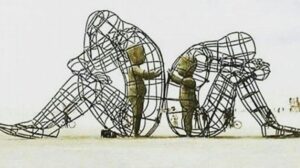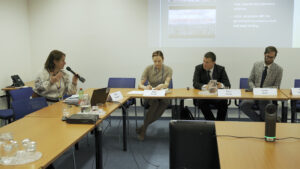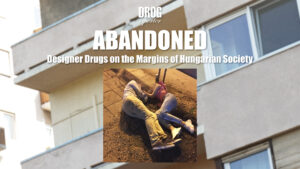“Instead of promoting harm reduction programs, journalists and other relevant actors use stigmatizing and discriminating terminology” Ognjen Martinović and Irena Molnar from the Serbian NGO Re Generation deconstruct the problem drug and terminological confusion.
The human tendency to intentionally alter the state of one’s consciousness through substance use has been always present. There are some theories, such as Terence McKenna’s theory, which suggests that primates (if we assume that they are the evolutionary ancestors of humans), after the most recent ice age, at the beginning of the birth of vegetation on the territory of the African continent, used psilocybin mushrooms, which spurred the development of abstract thinking and operating, with humans thereby becoming consciously connected and starting to interact with the world around them.(1) Hundreds of thousands of documents testify to the socio-cultural diversity of the use of these and other substances (depending on the geographical location), as well as the living material that is currently present and is subject to anthropological research and analysis. Recent history has given us another term in the context of drug consumption, that refers to abuse and craving – “addiction”.
This term originated in the 19th century when the general population of North America and Europe got the opportunity to try psychoactive plant extracts that were brought by their feudal representatives of colonized territories in Africa, South America and the Middle East. Therefore, the end of the 19th century, in this context, has a double meaning for the discipline we represent.
Namely, at the same time as addiction was becoming a socially recognizable “pathological” condition, the discipline of anthropology was experiencing its fastest development until now. And both of these developments can be linked to the emergence of global capitalism and its characteristic tendency of labour control. At that time, the focus of anthropology (at least initially) was on understanding the indigenous nations which were branded with a colonial status (including their potential to serve as passive workers), with the term “dependency” (or “addiction”) usually being used (and still used) for the purpose of labelling groups or individuals who represented the possibility of resistance to the dominant colonial powers.(2)
Taboos, such as psychosis, addiction, violence and drug abuse could no longer be ignored by anthropologists, especially in the late 1960s and early 1970s, when drug use underwent a revolution, as the number of consumers in the West grew dramatically.
This development required a thoroughly critical examination of the problem, with establishment of strictly regulated and exact terminology and development of amendments and supplements to legal regulations to ensure a scientifically substantiated and evidence based policy towards drugs. However, in 1971 the United Nations Convention on Psychotropic Substances followed, with many quick and insufficiently precise definitions and where drugs were defined as “any natural or synthetic psychotropic substances, which may cause: 1) the state of dependence; 2) stimulation or depression of the central nervous system that leads to hallucinations or disorder of motor function, or reasoning, behaviour or perception or mood, or 3) abuse and negative consequences – health and social problems.”(3)
This narrowed the scope of the term and reduced the range of meanings, mainly with the aim of bringing down psychoactive substance use of natural or synthetic substances, regardless of their origin, affect on the brain or central nervous system and potential of developing habits. Therefore, it is those substances that lead to changes in mood, perception, consciousness or some vital bodily functions, and can potentially lead to abuses, which are seen as having harmful consequences for users, even though most of the time this is not the case.
In Serbia’s criminal legislation, there is also a similar, quite incomplete and narrow definition of “opioid drugs” (“narcotic drugs”), which are classified as “substances of natural or synthetic origin, and the use of which can result in dependency, which can cause damage to health or can otherwise threaten the integrity of the human physical, psychological or social state. Psychotropic substances also fall under the definition of Narcotic Drugs”.(4) With the term “opioid drugs”, by adding an adjective to the noun “drugs”, our legislators do not contribute to the clarification, but contribute to additional terminological confusion and distortion of the facts. Substances with opioid effects or opiate types of psychoactive substances, cannot be placed in the same category as other psychoactive substances such as amphetamine, cocaine and other stimulants; or LSD, psilocybin mushrooms and other psychedelics/hallucinogens. The reason for this illogical terminology can be found in the history of the country’s cultural heritage. Specifically, during the centuries of Ottoman Empire, in the Balkan Peninsula, cultivation of opium poppy was widely spread and opium smoking among the population of the Islamic religion was common. Part of the Christian population in Macedonia and southern Serbia adopted the habit of consuming opium.(5) Thus, the origin of drugs has been linked to derivatives of opium – opioids, and so our legislators resorted to the use of the term “opioid drugs”. However, opium is no longer consumed traditionally and this phrase should not exist in the domain of strict and exact legal terminology.
Today Serbia is, unfortunately, having more problems with terminology used in not just professional but also colloquial language regarding substance use. Terms like addict, abuser, and junkie are pejorative terms but are very often used in Serbian “journalism”. For example, instead of promoting a good cause and reporting on the benefits of harm reduction programs, the opening of a DCR in Glasgow was described in quite a sensational manner “With drugs against drugs – Needles, syringes and heroin for free!”(6) Following the text of the paper the journalist then calls DCRs “rooms for a fix” and the words needle, syringe and drugs are all in bold print.
On the other hand, language used in professional settings, at conferences and international meetings, reflects an even higher level of ignorance and causes disappointment. During recent important international events, translators hired to translate Russian – Serbian and Serbian – English, seemed as if they didn’t really have knowledge of the topic with which they had to work that day. One could hear terms like “narcological institutes, narcological offices, anti-narcoman strategies (strategies against drug abuse), narcological dispensers, narcoman addicts”, which obviously shows the degree of ignorance from the side of professionals. Professionals, who should consider that the aims of drug policy strategies, in most of the cases, especially emphasise the importance of decreasing the levels of discrimination and stigma of people who use drugs.
Instead of promoting harm reduction programs as healthy and human oriented approaches to the wider public, journalists and other relevant actors almost always use stigmatizing and discriminating terminology. The terminology used to describe addiction has contributed to stigma still being the biggest barrier to addiction treatment, as faced by patients. The terms used in colloquial and professional language should reflect today’s greater level of understanding. By choosing, and moreover, educating people to use terminology that is not stigmatizing, we can begin to undo the stereotypes connected with substance use problems. We should all keep that in mind.
Ognjen Martinović and Irena Molnar, NGO Re Generation
Bibliography:
(1) „Stoned ape“ theory of evolution
(2) Singer, M. (2012). Anthropology and Addiction: An Historical Review. Addiction. Vol. 107, pg. 1749
(3) Law on ratification of the Convention on psychotropic substances 1973. SFRJ. N40, pg 1194-1195
(4) Criminal law of the Republic of Yugoslavia, comment on article 245
(5) Radulović, D. (2008). Pristup proučavanju društvene kontrole droga II: Dekonstrukcija problema – upotreba droga u naučnom diskursu. Sociologija. Vol. L, str 239
(6) http://mondo.rs/a952509/Info/Svet/Glazgov-Velika-Britanija-Sobe-za-fiksanje-besplatan-heroin-spricevi-i-igle.html






